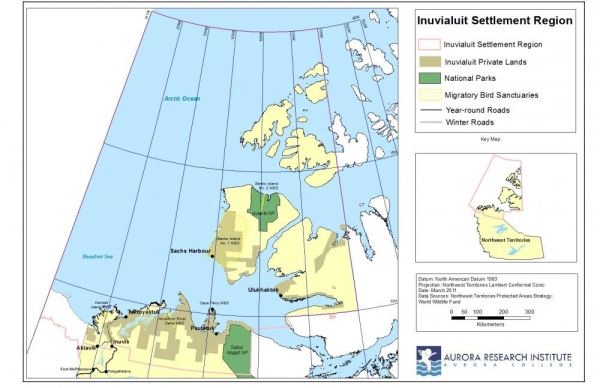The Inuvialuit Final Agreement (IFA), implemented in 1984, authorized the transfer of ownership of large tracts of land within the Inuvialuit Settlement Region (ISR) from the Government of Canada to the Inuvialuit. The ISR is located in the northwest corner of the NWT and the northern portion of Yukon. The ISR is divided into Crown Lands and Inuvialuit Private Lands. The Inuvialuit Private Lands are further divided into lands in which the Inuvialuit have ownership of surface and subsurface minerals referred to as class 7(1)(a) lands, and lands with only surface rights referred to as 7(1)(b) lands. Documentation of consultation and consent by appropriate agencies is required for the issuing of an Aurora Research Institute Research Licence. In the ISR, researchers should allow a minimum of 45 days for screening and the processing of research applications.
Crown and Private Lands (including National Parks)
If your research takes place on Crown or private land in or adjacent to the ISR (see map) you should contact the Environmental Impact Screening Committee (EISC) to determine whether or not your activity will need to be assessed for potential environmental impacts. The EISC is one of five co-management bodies established under the IFA. These co-management bodies are part of the resource management regime in the ISR. Each board serves to jointly manage resources on land within the ISR. You need to submit their application at least 45 days prior to their scheduled meeting date in order to be placed on the agenda for that meeting.
The Inuvialuit Land Administration (ILA), based in Tuktoyaktuk, is responsible for administering and managing the lands received under the Inuvialuit Final Agreement. The ILA reviews and approves applications to access and use Inuvialuit lands. Permits are required by researchers in order to access Inuvialuit private lands. You should contact the ILA to confirm whether or not you need to apply for a land use permit. If so, you will need to prepare a separate application for that permit.
The EISC, the ILA, and ARI recently agreed to streamline our community consultation processes. Since the ILA defers to the EISC decisions to issue licences and ARI defers to both the EISC and the ILA, the following processes are effective for all new applications:
- If an application requires screening by the EISC, then the EISC will take the lead on that application (ARI and ILA will defer to their process).
- If an application does not require screening by the EISC, but does require an ILA land use permit, then the EISC will take the lead on that application (ARI and ILA will defer to their process). The Wildlife Management Advisory Council (WMAC), the Fisheries Joint Management Committee (FJMC), and the Inuvialuit Game Council (IGC) still want to be notified of projects that do not require screening (because the EISC ordinarily notifies them for projects to be screened).
- If an application does not require EISC screening (or already has multi-year approval) and does not require an ILA land use permit, then ARI will use the Scientific Research Licensing process for that application.
- EISC screening is usually triggered under the following circumstances: research that is government funded, research that needs a land use permit, or research leading to non-renewable resource development.
You may direct inquiries to the agencies below:
| Environmental Assessment Coordinator Environmental Impact Screening Committee c/o Joint Secretariat P.O. Box 2120 Inuvik, NT X0E 0T0 Phone: (867) 777-2828 Fax: (867) 777-2610 e-mail: eisc@jointsec.nt.ca URL: http://www.screeningcommittee.ca |
Chief Land Administrator Inuvialuit Land Administration P.O. Box 290 Tuktoyaktuk, NT X0E 1C0 Phone: (867) 977-7100 (Switchboard) (867) 977-7106 (Land Use Applications Manager) (867) 977-7108 (GIS Technician/Land Management Officer) Fax: (867) 977-7101 URL: http://www.irc.inuvialuit.com/ |
If your research will extend for a period of greater than 100 person-days on Crown Land, then you will require a Land Use Permit from the Department of Indian and Northern Affairs Canada.
Community Consultation
Before an Aurora Research Institute Scientific Research Licence is issued, the researcher must consult with and gain approval from the appropriate community organizations. Research involving land, water or wildlife within the ISR requires approval from the local Hunters and Trappers Committee(s) (HTCs). For research into social, cultural or economic aspects, or the testing of people, consult with the local Community Corporation(s). In addition, for research on social and cultural aspects, consult the Inuit Research Advisor at:
Shannon O'Hara
Inuit Research Advisor
Inuvialuit Regional Corporation
Community Development Division
107 Mackenzie Road, 1st Floor
Bag Service #21, Inuvik, NT X0E 0T0
Phone: (867) 777-7026
Fax: (867) 777-2138
e-mail: so'hara@irc.inuvialuit.com
The Inuit Research Advisor can also be a resource for researchers during community consultation and/or when researchers want to involve Inuvialuit beneficiaries in their projects. The Inuit Research Advisor is a position funded by the Northern Contaminants Program, ArcticNet and Nasivvik, and although it concentrates efforts around research from these three programs, it is made aware of all research in the region. As an additional note, there are Inuit Research Advisors in all other Inuit regions in Canada (Nunavut, Nunavik and Nunatsiavut).
Further information regarding research involving people is also available at:
Inuvialuit Cultural Resource Centre
Bag Service #21
Inuvik, NT
X0E 0T0
Phone: (867) 777-2595
Fax: (867) 678-2597
e-mail: icrc@irc.inuvialuit.com
Any research within the municipal limits requires approval from the Municipal Council(s).

